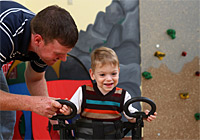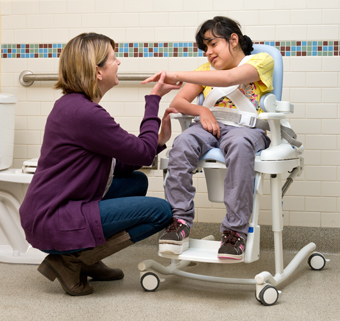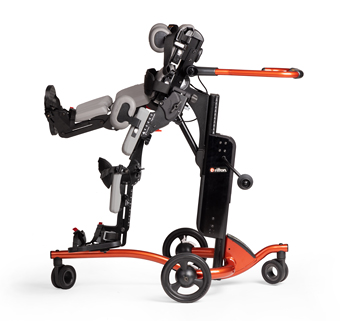Updates in Motor Learning
| February 2022 An increased clinical understanding of motor learning to facilitate sustained change in motor behavior continues to broaden the scope of physical therapy interventions and improved outcomes.
An increased clinical understanding of motor learning to facilitate sustained change in motor behavior continues to broaden the scope of physical therapy interventions and improved outcomes.
A recent research article, “Updates in Motor Learning: Implications for Physical Therapist Practice and Education,” adds to this body of knowledge by addressing current applications of four well-studied motor learning mechanisms: use-dependent, instructive, reinforcement and sensory-motor adaptation motor learning.1
(In this paper, “mechanism” generally refers to the processes through which motor learning occurs.)
1. Use-Dependent Motor Learning
With use-dependent motor learning, the change in motor behavior is driven by repeated task-specific practice by the learner. The learner must be exerting motor effort while actively practicing the task. Use-dependent learning also requires a degree of cognitive engagement in the task – that is, the learner makes intentional changes to their movements to solve the movement problem and achieve the task goal. Along with task specificity and cognitive engagement, aerobic intensity is another parameter that may be manipulated to optimize use-dependent learning.
Long-lasting improvements in motor behavior from repeated practice are a result of experience-dependent neuroplasticity or structural and functional changes throughout the central nervous system.2 Extensive task practice results in more automatized behaviors and thereby reduces the cognitive load required to complete the task.
A disadvantage of use-dependent motor learning is that achieving long-term improvements in motor behavior can require weeks or months of practice, and the generalization from training to real-world progress can be minimal.
2. Instructive Motor Learning
Instructive motor learning occurs when the physical therapist provides the learner with external feedback about a movement error or performance relative to a task goal. This knowledge of performance prompts the development of an intentional error-reducing movement strategy by the learner. For example, for an individual who veers to the left when walking, a therapist might say, “Take bigger steps with your left leg” or “Take longer steps with your left foot.”
With instructive motor learning, the error-reducing movement strategy can be explicitly described by the learner and reproduced in the future. If the patient can voluntarily produce the desired motor behavior after initial learning, then the instructive or strategy-based motor learning was retained.
There is a strong relationship between cognition and the capacity for instructive motor learning. Therefore, patients with cognitive deficits may not respond as well to this particular motor learning mechanism as their cognitively able counterparts.
Note: The extensive active practice that drives use-dependent learning (as described above) will likely also be necessary for the new movement to become automatic or habitual. As well, full development of a new movement habit may require practicing it within multiple contexts that require the learner to employ and generalize the learned movement strategy.
3. Reinforcement Motor Learning
Reinforcement motor learning is driven by outcome-based feedback or knowledge of results.
The feedback is binary: the movement results in success or failure. In this case, the learner does not receive information from the physical therapist about how the movement needs to be modified for success. This nondirectional, noninstructional feedback prompts the learner to explore different movements and select actions that have the highest probability of success while avoiding actions with low probability of success.3 Reinforcement learning can lead to sustained improvements in motor behavior even within a single session.
For example, the therapist might intentionally position an individual who veers to the left when walking. The therapist may orient the learner in a hallway, with the wall nearby on the left. The learner will attempt to successfully avoid colliding into the wall without the therapist saying anything.
The exact involvement of cognitive processes in reinforcement motor learning is not known. In theory, because of the variability of an individual’s movement during practice, a successful movement would eventually and spontaneously occur. And this would bias future movement selection toward the successful or rewarding outcome, even without conscious or cognitive effort.
More recent theories suggest that intentional exploration of different movements in search of successful behavior may be critical for reinforcement learning. Emerging research indicates that reinforcement motor learning may require more cognitive processing than originally proposed.4, 5
Retention is when the learned movement persists beyond the practice period. Training protocols that require the practice of a novel task with reinforcement learning have found improved retention over those protocols without reinforcement motor learning.6, 7
Interestingly, when compared to sensorimotor-based adaptation (discussed below), the improvements observed with reinforcement learning take longer to develop. Nonetheless, despite the apparent slower rate of learning, reinforcement motor learning is associated with longer retention of acquired movements.
4. Sensorimotor Adaptation-Based Motor Learning
Sensorimotor adaptation-based motor learning occurs when the actual sensory consequence of a movement differs from the predicted sensory consequence of the movement. In other words, the individual encounters an unexpected task demand or a change in the environment that requires modifications to the executed motor program. An example might be walking with a gait device on a gradual downhill slope after an initial period of walking on the level: the proprioceptive feedback of the lower foot-ground contact position is unexpected. When these errors are detected, the motor command is automatically updated to adapt the movement.
Movements are adjusted repetition-by-repetition to quickly reduce sensory prediction errors, allowing for flexibility of movement in the context of many different task demands. Sensorimotor adaptation-based motor learning occurs rapidly, resulting in a change in motor behavior over minutes. It is currently thought that sensorimotor adaptation occurs automatically, independent of intentional modifications to movements. So cognition may not be essential for this mechanism of motor learning. Remarkably, sensorimotor adaptation still occurs even when intentional attempts are made to prevent people from correcting their own movement errors.8
Evidence from recent research studies suggests that sensorimotor adaptation happens alongside instructive or strategy-based motor learning. For example, one recent study found that learners, when instructed, could voluntarily demonstrate part of a new walking pattern initially learned through sensorimotor adaptation.9
However, more work is necessary to understand how both voluntary and involuntary motor learning mechanisms interact to elicit an overall change in behavior during walking or other motor tasks.
Implications for Physical Therapy
Research now recognizes that there are distinct, co-occurring motor learning mechanisms that result in sustained changes in movement. With a more comprehensive understanding of motor learning, clinicians can incorporate a greater variety of methods to promote new movement skills.
Currently, physical therapist interventions primarily focus on use-dependent and instructive motor learning. Moving forward, physical therapists should consider reinforcement motor learning and sensorimotor adaptation-based motor learning as part of our toolbox.
Interventions can be carefully designed to leverage any or all of these four motor learning mechanisms. The relative contribution of each of the four motor learning mechanisms can be manipulated by incorporating their unique drivers into movement practice:
- Repeated task-specific practice drives use-dependent motor learning.
- Therapist feedback on motor performance will drive instructive (i.e. explicit, strategy-based) motor learning.
- External outcome-based, knowledge of results feedback (success/failure) with no therapist feedback, will drive reinforcement motor learning.
- Unexpected task demands or a change in the environment (i.e. perturbations) will drive intrinsic, sensorimotor adaptation-based motor learning.
Active engagement in the task remains the essential requirement to promote use-dependent motor learning. But the authors also make note that the foundational understanding of motor learning optimization was established primarily through studies of use-dependent motor learning and instructive motor learning. So the degree to which these same principles translate to reinforcement motor learning or sensorimotor adaptation-based motor learning is currently unknown. Future research is consequently needed to test the efficacy of these different learning mechanisms to learn a wide range of motor tasks.
Read the full paper here:
Updates in Motor Learning: Implications for Physical Therapist Practice and Education
References
- Leech, K.A., Roemmich, R.T., Gordon, J., Reisman, D.S., Cherry-Allen, K.M., Updates in Motor Learning: Implications for Physical Therapist Practice and Education, Physical Therapy, 2021;, pzab250, Accepted Manuscript, published 25 October 2021. Free Full Text
- Kleim JA, Jones TA. Principles of experience-dependent neural plasticity: implications for rehabilitation after brain damage. J Speech Lang Hear Res 2008 Feb;51(1):S225-239. Free Full Text
- Lee D, Seo H, Jung MW. Neural basis of reinforcement learning and decision making. Annu Rev Neurosci. 2012;35:287-308. Free Full Text
- Uehara S, Mawase F, Therrien AS, Cherry-Allen KM, Celnik P. Interactions between motor exploration and reinforcement learning. J Neurophysiol. 2019 Aug 1;122(2):797-808. Free Full Text
- Holland P, Codol O, Galea JM. Contribution of explicit processes to reinforcement-based motor learning. J Neurophysiol. 2018 Jun 1;119(6):2241-2255. Free Full Text
- Abe M, Schambra H, Wassermann EM, Luckenbaugh D, Schweighofer N, Cohen LG. Reward improves long-term retention of a motor memory through induction of offline memory gains. Curr Biol CB. 2011 Apr 12;21(7):557-562. Free Full Text
- Shmuelof L, Huang VS, Haith AM, Delnicki RJ, Mazzoni P, Krakauer JW. Overcoming motor “forgetting” through reinforcement of learned actions. J Neurosci Off J Soc Neurosci. 2012 Oct 17;32(42):14617-14621. Free Full Text
- Long AW, Roemmich RT, Bastian AJ. Blocking trial-by-trial error correction does not interfere with motor learning in human walking. J Neurophysiol. 2016 May 1;115(5):2341-2348. Free Full Text
- French MA, Morton SM, Charalambous CC, Reisman DS. A locomotor learning paradigm using distorted visual feedback elicits strategic learning. J Neurophysiol. 2018 01;120(4):1923-1931. Free Full Text







